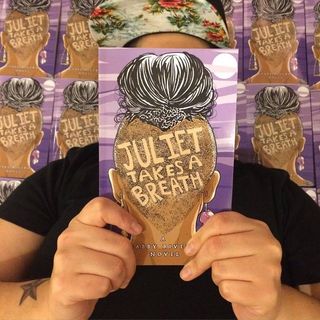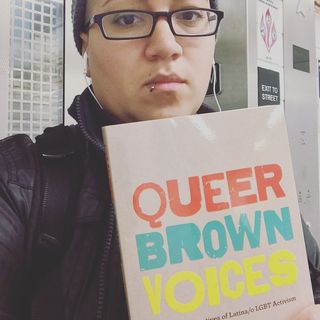Trauma
The Power of Seeing Ourselves in Literature
Gabby Rivera's debut novel offers a life raft for queer youth.
Posted February 18, 2016
Literary superstar Roxane Gay calls Gabby Rivera's debut novel, Juliet Takes a Breath, "Exuberant and gorgeous." The new title from Riverdale Avenue Books follows a young queer Puerto Rican woman from the Bronx who spends a summer in Portland, Oregon as an intern to Harlowe Brisbane, a white, rad/hippie, feminist author.
An early version of the story appeared in Portland Queer: Tales of the Rose City, an anthology I edited in 2009, and Gabby wrote a draft of the book while she was camped out in my turquoise travel trailer in New Mexico—so I've been around as she's been creating this story.
Still, the final version made me laugh and nod—and charmed me anew. It's at once engaging, funny, and an important contribution to the slowly-growing body of queer coming-of-age literature that changes lives—that saves lives.
"Even if Holden Caulfield was born in the Bronx in the 1980s," author Inga Muscio writes, "he could never be this awesome."
"And if you are queer or a POC," Gay Tweeted, "Juliet Takes a Breath is the kind of novel that allows you to see some part of yourself in good fiction."
Ariel Gore: This is a multi-layered novel, but in some ways the set up is about seeking a lineage or a family outside one’s family of origin. What does Juliet think she’s going to gain by leaving the Bronx for an internship with an older white feminist in Portland, Oregon?
Gabby Rivera: Juliet is seeking community. Her relationship with her girlfriend, Lainie, is a secret they’re both keeping from their families. She doesn’t feel connected to the LGBT group at college because she’s still closeted and it’s filled with mostly white gays. But ye she feels connected to Harlowe, a white lesbian feminist, because Harlowe speaks an anti-patriarchal, pro-womanhood, pro-take-ownership-of-and-love-your-body type of language and that’s something Juliet hasn’t ever experienced. Like, there’s a lot of catcalling and aggression towards women in Juliet’s Bronx neighborhood and she’s so over it but no one around her is speaking a language that addresses and condemns that behavior from those boys. Also, no one at home is telling her it’s okay to rage out, to to be a huge dyke, and to make out with girls. Even her girlfriend is trying to hide her, which is silencing and isolating. This is what draws Juliet to Harlowe and pushes her out of the Bronx to find community, to find her people.
It’s not all about Harlowe’s book, though. Juliet’s mom, Mariana, is a strong, dedicated mom and her feminism is tied to being Latina, managing a household, and looking out for her own. Juliet is essentially thirsting to bridge the gap between Harlowe’s feminism, her mom’s traditions, and the identity she is desperate to develop for herself. Leaving the Bronx and heading out to Portland is one way within her control to move forward.
Her last name is Palante for a reason.

Ariel Gore: What’s the hardest truth she has to come to terms with?
Gaby Rivera: Juliet doesn’t trust her power in the beginning of the book. This is why she’s obsessed with Raging Flower, the feminist book written by Harlowe Brisbane. Juliet is struck by Harlowe’s ability to speak with such confidence and unfettered contempt for male domination. Juliet is awed by the way Harlowe writes about loving her body and loving the bodies and souls of other women. These are things that Juliet doesn’t know how to say. But she also doesn’t know how to reconcile her adoration with the fact that Harlowe is speaking from a white lady’s perspective. Juliet’s not even sure if she has the right to question Harlowe’s point of view, but she does anyway – albeit a bit nervously. Accepting her power and her absolute right to take up space is the hardest thing for Juliet to accept and embody.
Ariel Gore: Roxane Gay has been Tweeting her love of Juliet Takes a Breath. Are you dying?
Gabby Rivera: Literally so dead that I don’t know how I’m typing these words right now to be honest. Her praise – like yo! – the fact that she went out of her way and bought a copy of my book still blows me away. And then to go out and tell people she liked it; that’s just mad cool, you know?
Moving in this world as a queer brown dyke isn’t easy. No one expects too much from us and access to certain spaces are limited, like elevated writer’s spaces and the media in general, right? Women are constantly portrayed in the media as not being able to get along. Add on to that the feelings of many POC where it’s like, “is there space for all of us?” There’s this notion that if one person of color achieves greatness or finds some sort of success then they must hold it at all costs. They have to keep all the networks and access for themselves because if they hold the door open for someone else, it may shut in their face. It’s this unspoken fear, I think. Not everyone has it. There are plenty of glorious humans working in the creative arts who make it a point to offer mentorship and guidance to young artists. Roxane Gay is one of those humans, I think. By continuing to foster growth and offering other people of color access and room to shine, it allows us all to build community and relish in the glory of our collective work.
So a public shoutout on social media from Roxane Gay is in and of itself a radical act. It’s like, “I see you, young sis, doing your thing. I support that forward movement. There’s room for you here with us all of us. Keep on doing what you do because it’s great.” That’s what it feels like and that’s amazing and perfect.
Ariel Gore: The book is stunning by anyone’s standards, and it’s getting extra love because queer POC coming of age stories can be hard to come by. Were there any queer POC coming of age books that saved you?
Gabby Rivera: Whoa wow, thanks so much for phrasing this question that way. Your love is real too you know? Like would this book exist without my time in your trailer in the desert? Maybe not.
Queer POC coming of age books? First and foremost, Cristy C. Road did the cover art and I’m gonna be bold and say she made something iconic. She created a piece of art that’s connecting to queers all over and it’s a cover that stands out in a sea of books. She’s a brilliant artist. Cristy Road’s books made me want to scream and shout into the void. Her gritty, punk, queer Latina graphic novels shattered me right open and hit me in this space in my chest where for the first I saw another way to be Latina. Her books showed me that you could be messy, bleeding, and listen to heavy metal -- and still be as Latina as Rita Moreno or Celia Cruz.
Cristy made room for me and Juliet and produced a stellar cover. If you haven’t read a Cristy Road graphic novel, please go out and buy Bad Habits right now.
Also, Flaming Iguanas forever. Erika Lopez killed it with that one. Classic. Ridiculous and so perfect.
But as a teenager, I don’t think I read any queer POC coming of age books. None were shared with me and I didn’t even know how to find them back then.

Ariel Gore: In the beginning of Juliet Takes a Breath, Juliet has just come out to her family, she’s not sure if her mother will ever speak to her again, and she flees the Bronx and everything she’s ever known. With all the queer visibility these days, it’s sometimes hard to remember that coming out can be so traumatic. Talk to me about that.
Gabby Rivera: I don’t want to use the term traumatic in the context of Juliet’s coming out. I think her experience is wrenching and heart-breaking but I’m not sure if it’s an example of her experiencing trauma. That narrative is super real for other people, especially given that 40% of homeless youth are LGBTQ.
Juliet isn’t abused by her family and she isn’t stripped of shelter, care and food. Trauma is experienced in many forms. Coming out and even initial rejection from parents may be a form of trauma but in the context of Juliet, I don’t see it that way. My intentions behind that chapter are not to depict trauma but to develop a narrative centered on the difficulty faced when asserting one’s identity.
Being in the closet built up so much anxiety inside Juliet and without any guidance, making some huge statement about her identity was terrifying. There’s a fresh wave of youth feeling like coming out shouldn’t even be a thing. -- their vibe is to live as themselves and they don’t feel any need to make any announcements -- and I get that. I think it’s bold and glorious to live that way. But in a family situation where eventually everyone is going to wonder why you’re not married or pregnant or both, coming out was and is still a way of saying “No, you don’t get to lay out my life. I am me. I am queer. I am brown. I am a feminist. I am I am I am. And you cannot undo that with your expectations or disappointment. You will hear me.”
I think we’ve seen so many coming out narratives centered on gay white males or young white edgy lesbians. I mean, I was overjoyed just seeing Santana and Brittney fall in love on Glee and watch Santana come out to her grandma, you know? That was still so recent in our media history.
Ariel Gore: You’ve said you want queer brown girls to see themselves everywhere. In your experience, what are the psychological effects of not seeing yourself represented in literature?
Gabby Rivera: You just feel like you don’t fucking exist outside of your neighborhood. And since the rest of the world doesn’t live on the block with you, they don’t know you’re a real person. When you step out of your neighborhood, you’re a walking stereotype for every white person who’s never met a Latina or a Black person or a gay person. Lord help you if you have more than one marginalized identity because then you’re an intersectional Ringling Brothers Circus for everyone to gawk at and test their hood skills on. that’s what it is to be under/mis/not represented.
Young Latinas have the highest suicide rates in the country. Queer youth, and especially trans youth of color have the highest rates of homelessness in the country. Our cis and trans black brothers and sisters are dying out in the streets.
We need more stories told by us about us to provide hope and to help each other survive. Juliet Takes a Breath is one story. We need a million others. We need that graphic novel about a queer, gender-non-conforming teen who’s a genius and can fly or a book about a bisexual Native trans woman who’s going to medical school and fighting racist bullshit back home on her family’s rez. We don’t need Paul Blart: Mall Cop 3. You know? We don’t need another story about a brave young little white boy fighting the monsters and saving the universe either.
I could keep going. Representation is vital. We need to see ourselves reflected in media and literature and history and science and the stories must come from us. We must envision a radical queer brown vibrant utopia that moves with intersectional feminism, is unapologetically pro-Black, anti-capitalism, takes no shit and pushes all of us towards evolution.
Ariel Gore: And then what happens when, for the first times, you do see yourself?
Gabby Rivera: You are reborn.




